- Home
- Joel Rosenberg
Hour of the Octopus
Hour of the Octopus Read online
Hour of the Octopus
D'Shai
Book II
Joel Rosenberg
Ace edition / March 1994
Copyright © 1994 by Joel Rosenberg.
Content
Dedication
Acknowledgments
Part One Den Oroshtai
Prologue The Hour Of The Hare
Chapter 1
Chapter 2
Chapter 3
Chapter 4
Interlude: The Hour Of The Ox
Chapter 5
Chapter 6
Part Two Glen Derenai
Chapter 7
Chapter 8
Chapter 9
Chapter 10
Interlude: The Hour Of The Lion
Chapter 11
Chapter 12
Chapter 13
Chapter 14
Interlude: The Hour Of The Octopus
Chapter 15
Chapter 16
Chapter 17
Chapter 18
Chapter 19
Part Three Den Oroshtai
Chapter 20
Dedication
This one is for Susan Allison
Acknowledgments
I’m grateful for the help I’ve gotten with this one from Bruce Bethke, Peg Kerr Ihinger, and Pat Wrede; from Harry F. Leonard and Victor Raymond; from Beth Friedman, proofreadre, and Carol Kennedy, copy editor.
I’d like to thank Ray Feist for the metal puzzle Kami takes apart, but I spent far too many work hours working it out, so I won’t.
As always, special thanks to my agent, Eleanor “Darth” Wood, and to Felicia and Judy.
Part One
Den Oroshtai
Prologue
The Hour Of The Hare
“You may think of yourself as a master chef, in Bergeenen you may have actually been a master chef, but this, my dear young cook, is Den Oroshtai, and this is your first morning in my kitchen, and as it is my kitchen, you will learn; I trust you will find the experience pleasurable as we prepare breakfast for our genial Lord Arefai and our somewhat more strict Lord Toshtai, a simple breakfast and a complex one.
“Don’t think of time as a process. Think of it as a spice. You can no more measure it out as drops of water from an hourglass than you would measure spoons of pepper for a sauce; you must add just a little, tasting where possible, considering where not, until you have added just the right amount, no more, for you can no more remove excess time from a dish than you can unsalt it.
“Ah: observe: the surface of the water gently roils; it is now ready. Cradle the egg in your palm, and consider its temperature. Heat is just another manifestation of time— how long has the egg sat in the bowl of cold well-water, and then, how long has it waited on the counter? Consider it all.
“Lower the egg gently into the water, and regard it. The objective is to coddle the egg, to indulge it, to tease it at the simmer until the yolk has become thick without becoming hard, where it is still golden and languidly liquid rather than insipid yellow and tough, the white gaining form and structure without becoming rubbery and chewy.
“Good. Oh? You wish to sit and stare at the boiling water until the egg is done. How very nice—and who will prepare the rest of the simple breakfast?
“Oh. I talk too much, do I? I distract you from the brilliance of your endeavors, is that so? Very well, then; I will let you do it in your own fashion. What next? The apple, you say? Oh, good. Very good. Yes, you slice the apple gently, delicately. Very nice. I very much like the rhythm of your knife against the cutting board, and the slices are just of the right thinness to the taste of many, like that of a thin cracker.
“Your arrangement? Myself, I’ve always liked to snick out the pieces of core, reassemble the apple, then set it upon a bed of mint leaves, a twist of caramelized sugar to replace the stem, but I am sure that you have a better idea. Ah. Very pretty. Certainly: you’ve not done wrong to spread it out along the rim of the plate, like a stack of fallen tiles. Very pleasing to the eye. Ah, and you brush the apple lightly with the juice of a lemon. Very good; it will not turn brown in the air.
“And next, the oysters and sausage. A strange but interesting combination, I’ve always thought, wonderful if handled properly, but ever-so-dependent on preparation, and—oh, I am sorry. I do talk too much. Prepare it as you wish. Hmm… slicing off the top of a puff pastry, eh? Not my choice of a presentation, mind, but an interesting one.
“Yes, I do always heat the pan before adding the dab of butter, a shaking of two peppers in the pan, the barest scraping of horseradish. And then the oysters. They are fresh; this very hour, a runner arrived with them from Bergeenen, carefully packed in ice. The oysters, oh wise one, not the runner.
“Hmm… I would probably have opened the shells with a different knife, but each to his own; the blood will wash off, and you should be healed within the month.
“They do plump up prettily, don’t they? And they are tasty as they sit on top of the sausage.
“Pour the tea into the mug, and the tray is ready, you think. I can but bow and nod. Very well; you may bring it in. Me? Don’t be silly. When it is asked who is the fool boiled the egg to indigestibility, who is the dolt who served the apple sliced far too thinly to be properly crunched between his teeth, who is the blockhead who served the cooked oysters and undercooked sausage thick with congealed fat in a stale puffery, the answer will not be that I did it, I can assure you of that.
“You had better run, now. It is already the hour of the hare, and Lord Toshtai will be expecting his simple breakfast of egg, apple, and oysters with sausage right now. Oh, yes, the simple breakfast is for Lord Toshtai; the more complex one is for Lord Arefai, who hunts this morning. Had I not mentioned that? Oh.
“Timing is, after all, everything.”
Chapter 1
Morning, breakfast, an invitation, and other petty indignities.
Timing is, as my father used to say, everything.
No, I’m getting it wrong, as usual. I mean, he probably still does say it—I have no reason to think Gray Khuzud dead, and less to think he’s changed his mind—but I haven’t seen him for some time now.
He is right, of course; my father has always had that annoying tendency. It doesn’t apply just to juggling, although that’s one of the places.
Consider, if you will, the knife-and-apple act. After the drunk act, I’d say it was Gray Khuzud’s best. But if you put it at the head of the show, as an opener, not only will it not get the applause it should, but it will rob the rest of the show of some of its own virtue.
Not good.
Which isn’t to say that there is a right time for everything. For some things there is no correct time. We all can agree that there’s no good time for one’s piles to act up; similarly—and contrary to what our beloved ruling class believes—there is no such thing as a right time to be woken to go hunting.
He came for me in the hour of the dragon.
I was in the middle of a dream, although even sleeping I had been vaguely aware of somebody sliding open the panel between my bedroom and the outer room of my suite.
“Kami Khuzud—I mean, Kami Dan’Shir, wake up.” Something large and stupid hit me between the shoulder blades.
Even through the shattered remains of half-forgotten dreams of soaring silverhorns and fast-picked zivvers, I could tell that the rasp was the voice of Bek De Bran, a dull and blocky soldier who had recently been reassigned to protecting Arefai, whatever that portended.
It meant something; everything always means something. The only problems are what and how important is it? When you’re mingling with members of our beloved ruling class, it’s sometimes every bit as hard to discover the import of supposedly minor events a
s it is important to know the significance of major ones.
“Lord Arefai bids you join him at breakfast.”
Arguably, for Lord Arefai to have sent a member of his personal guard to wake even a lesser noble, much less a newly made bourgeois, was a signal honor. Unarguably, an invitation to join Arefai at breakfast was a great favor, no matter what it felt like, and to have the favor delivered so gently…
The standard way to wake a member of a lower class would be to send a servitor to kick me awake, or a soldier to poke a spear at my rumpled blankets. Sending Bek De Bran to shake me awake was a decided favor, given my status.
I tried to voice my gratitude.
“Mrph,” I said.
I was rewarded by a kick.
A kazuh Warrior would have come awake at the first touch, his sword in his hand, ready to block, parry, or attack. A kazuh Acrobat like my father would have already rolled to his feet or tumbled to a one-armed handstand.
I held up a hand. “Please be easy, Lord Bek De Bran,” I said. “I wake.”
I sat up on my sleeping pallet, rubbing at my eyes, then tossed the blankets aside and went to the wardrobe for some clothes. My head and eyes were so filled with sleep and muzziness that I didn’t stop to marvel at it. It’s hard for me to marvel at much in the hour of the dragon, the hour before dawn.
I didn’t take the kick as a personal affront, although the thought of juggling his internal organs had appeal. A bourgeois can afford to be thin of skin only around middle class and peasants; cultivating a leathery exterior is a necessity if you’re going to spend your time around nobility, and as a former peasant, I’d long since taken up the habit.
Not that there was anything particularly noble about the hulking creature looming above me in the gray murk that was broken only by the flickering light of the lantern he had hung on the wall in my workshop.
Bek De Bran was arrayed in full warrior’s garb, from the twin peaks of the lacquered steel helmet that topped his head, to the reticulated bone armor that covered his shoulders and chest, down to the skirt of leather straps that hung about his thick waist, partly covering the kneezers and greaves, and the brass-pointed boots on his feet. His armor’s finger joints clicked like dice to keep time against the shaft of his spear as he hummed a simple soldier’s jig.
It seemed to me to that he wore a lot more gear than a warrior should need to go wake up a dan’shir, but I didn’t mention that. For one thing, most of them seem to like dressing up in their outfits almost as much as they like singing, or beating members of the lower classes. But mainly, it’s that most of them seem to like beating members of the lower classes.
I stepped into my trousers—both feet at once, the way an acrobat dresses—then pulled a nappy cotton tunic over my head. I belted it tightly across my waist with a broad black sash.
He shifted his right hand to his spear, and idly poked at me with its rounded butt end.
“Be quicker, whether it pleases you or not. The hunt awaits Lord Arefai, and Lord Arefai awaits you.” Typical of a member of our beloved ruling class to be impatient to start a morning of killing things.
“Shoes,” I said. “I need shoes.”
“Just be quick about it.”
The donjon was quiet in the predawn light as we padded (well, I padded; Bek De Bran clomped and clicked and clacked) down the corridor, past a hallstand where a Klen vase sat, filled with an arrangement of wildflowers, a classic concentric arrangement of thorny, blood-red bantam roses surrounding an explosion of yellow daisies. As we passed, when my body blocked his view, I snatched one of the roses and tucked it into my belt, pricking my thumb on one of its sharp thorns.
As usual, my timing was faulty. Just at that moment, Lord Crosta Natthan rounded a corner.
Despite the obscenely early hour, the donjon’s chief servitor was completely ready for the day, the creases in his gray silk tunic and the pleats in the matching pantaloons fully pressed, the twin points of his goatee combed and oiled, and the rest of his lined face freshly shaved, his hair pulled back and bound with a bone clip. Despite his age, his step was brisk, and his glare was sharp and alert.
Despite it all, I enjoyed the moment. I’ve always liked matching wits with Crosta Natthan, no matter what the risk.
“Good morning, Lord Crosta Natthan,” I said, coming to an abrupt halt.
Bek De Bran probably would have chivied me along if I’d stopped for my own reasons, but not when I was having words with the chief servitor.
“And a good morning to you, too, Kami Dan’Shir,” he said, with equal lack of sincerity. “I trust you didn’t prick yourself too badly?”
“No, although I thank you for the concern,” I said, taking the rose from my belt and tucking it through a button loop on my tunic.
When in doubt, brazen it out.
He thought about it for a moment. There is only one punishment for theft in D’Shai; we may be hypocritical folks, but we are simple and direct in some things. The only question in his mind was whether or not my taking the rose constituted theft, in which case it was his duty to report it to Lord Toshtai. On the other hand, if I had a right to take the rose, then his reporting the matter would simply serve to annoy the lord of Den Oroshtai, and he wouldn’t want to do that. Annoying Lord Toshtai was neither part of his job nor likely to lengthen his life.
I bent my head to sniff at the rose. “Part of the Way of the Dan’Shir,” I said. “We appreciate beauty.” Well, the use of the plural was my right; as the only known Dan’Shir it was proper for me to speak for all of us, er, for all of me.
His sniff had nothing to do with smelling a rose. “I wonder how far you will get with this Way of the Dan’Shir,” he said, as he turned to rearrange the flowers, hiding the absence of the rose.
So do I, old man, I didn’t say.
He had a point, of course. I didn’t know how far I should—or could—push things. There are fifty-three known kazuhin, including that of the Dan’Shir. The origins of many of them—Warrior, Peasant, Deilist, others— vanish off into prehistory, when the Powers walked openly across the face of D’Shai. Quite possibly, some of the ancient kazuhin were originated by the Powers, although who can say?
But each of the historical professions traces its origin to a historical master, a historical originator, from the kazuh of the Ruler, created by the ancient Scion of the Sky Himself, to that of the Cook.
If you accept that the Way of the Dan’Shir, the Way of the Discoverer-of-Truths, is truly a Way, truly a kazuh, then that makes me the historical master of the Way, with all rights and privileges of a historical master.
Which, as we’ll all recall, included the right or privilege of Veren Del Gergen, the first Painter, to lose his head from a single sword stroke when ancient Lord Egware was offended by the classic if not entirely complimentary study “Kindly Lord Egware at His Leisure.” Which only goes to show, I guess, that being a historical master doesn’t necessarily give someone sense enough to stay away from members of our beloved ruling class.
I nodded as I walked on. “And a good day to you, Lord Crosta Natthan.”
His breakfast had barely arrived, but Arefai hadn’t waited for me before beginning. It wasn’t that he was being impolite, but it wouldn’t have occurred to him to wait, any more than he would have offered me a taste from his plate.
The breakfast cook had prepared for him a classic arrangement of the seven flavors. To the right of Arefai’s plate, a steaming ceramic mug of elderbark tea provided both the hot and the bitter, while a flask of crushed fundleberries in its bowl of shaved ice to the left of the plate stood in cold, sweet contrast. An arc of melon slices had been artfully spread across the top rim of the plate, each slice separated from the next in salty opposition by a paper-thin medallion of highly spiced Patricien ham.
An even dozen oysters on sausage circled the plate, interspersed with crispy morsels of bacon-wrapped quail, rice cups brimming with salted pout roe, and some oily white fish wrapped in chumpa leaves and sprinkled
with roasted sesame seeds.
The center of the plate was occupied by four ramekins, which looked to be the locally traditional four sauces: a peppery cheese sauce, so overripe I could smell the ammonia; a pale mayonnaise with dill and lemon; a thick compote of peppers, onions, and tomatoes, heavily sprinkled with basil; and a grainy brown mustard.
Delicately, Arefai extended an eating prong and speared a chumpa-leaf packet, elegantly tipping one end into the compote and another end into the dill sauce before bringing it up to his lips. He managed to take a bite out of each end without dripping sauce on his short-cropped beard or on his doeskin hunting tunic.
He finally noticed that I was just standing there, and waved me to a seat.
“Good morning to you, Kami Dan’Shir,” he said. “A fine morning for hunting, is it not?”
I looked up at the sky, which was busy deciding what light shade of gray to menace me with, and out at the horizon, where dark clouds loomed threateningly—something dark clouds always do—and then decided that theatrical gestures were neither called for nor entirely safe. An occasional, very carefully chosen bit of presumption tended to charm the likes of Lord Arefai, but it was best not to make a habit of it.
“I would presume so, Lord Arefai,” I said. “Certainly I wouldn’t argue with your assertion.”
After all, you overdressed if generally kindly idiot, I’ve always thought that my head is much prettier as an adornment to my shoulders than it would be rolling around on the ground and getting all dirty.
He smiled and took a bite of quail; the bird was juicy enough that he had to dab at the corner of his lips. The smell made my mouth water.
A white-clad servitor, her face holding that expression just between disdain and indifference that makes service folk think they’re invisible, brought out a tray with my breakfast on it. The cook had perhaps spent less time with my breakfast than he had with Arefai’s.
The tray held an apple—uncut, unpeeled, although apparently washed—accompanied by a large chunk of dark brown bread, supporting a dubious hill of butter. An unadorned chunk of pink ham lay on the plate next to the bread.

 The Road Home
The Road Home The Sword and the Chain
The Sword and the Chain Not Quite Scaramouche
Not Quite Scaramouche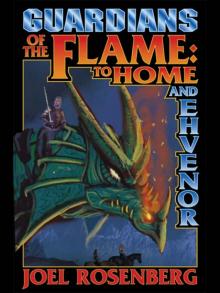 Guardians of The Flame: To Home And Ehvenor (The Guardians of the Flame #06-07)
Guardians of The Flame: To Home And Ehvenor (The Guardians of the Flame #06-07)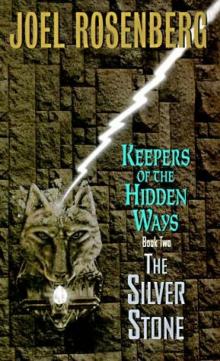 The Silver Stone
The Silver Stone Hero
Hero Not For Glory
Not For Glory The Sleeping Dragon
The Sleeping Dragon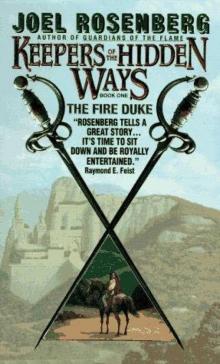 The Fire Duke
The Fire Duke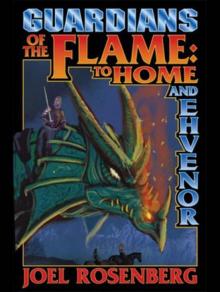 Guardians of The Flame: To Home And Ehvenor (Guardians of the Flame #06-07)
Guardians of The Flame: To Home And Ehvenor (Guardians of the Flame #06-07)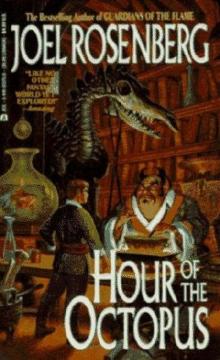 Hour of the Octopus
Hour of the Octopus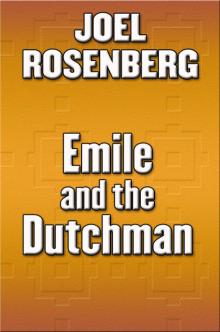 Emile and the Dutchman
Emile and the Dutchman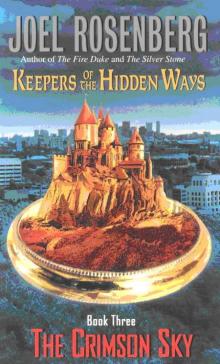 The Crimson Sky
The Crimson Sky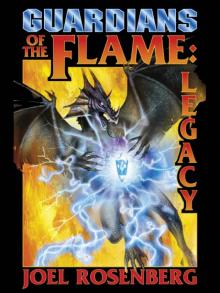 Guardians of the Flame - Legacy
Guardians of the Flame - Legacy The Silver Crown
The Silver Crown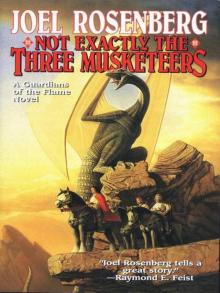 Not Exactly The Three Musketeers
Not Exactly The Three Musketeers Not Really the Prisoner of Zenda
Not Really the Prisoner of Zenda